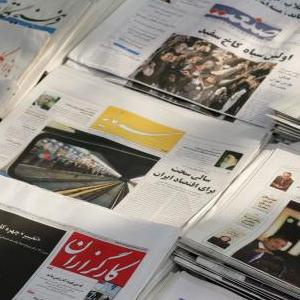Tehran's Daily Newspaper Review

Ayatollah Khamenei’s meeting with Ismail Haniyeh, Palestinian PM, was the top headline of Tehran's dailies today. Iran's Supreme Leader praised Hamas and the Palestinians for their resistance against occupation, and warned about pro-reconciliation agents infiltrating Palestinian resistance groups. He also assured the Palestinian statesman that Iran will always stand beside the Palestinians.
“Don’t get lured into over 20 percent interest rates” Iran quoted Deputy President of Central Bank Ebrahim Darvishi. The newspaper also featured a report on the political composition of the ninth parliament, arguing that with the increasing contention inside the Principlist camp, the next parliament will most likely have no such thing as a unified, dominant majority.
Jomhouri-ye Eslami’s front page was hogged by news from the Arab World. The sixth day of strikes in Israel, Mahmoud al-Zahar’ criticism of the Doha agreement between Hamas and Fatah, Saudi forces’ re-dispatch to Bahrain for a new crackdown on protestors, Arab League’s call for foreign intervention in Syria and Ayatollah Khamenei’s meeting with Ismail Haniyeh appeared on the newspaper’s headline. The editorial slammed the Saudi King Abdullah for his recent remarks on Syria, accusing of paving the way for the West’s dominance over the Middle East and undermining the resistance front.
Resalat’s editorial was a ‘discourse analysis’ of the people who rallied on Saturday in the 33rd anniversary of the Islamic Revolution’s victory. Itemizing the discursive elements of slogans chanted in the rally, the author concluded that the overall message of the 22nd of Bahman parade was a call for massive turnout in the upcoming parliamentary election and formation of a powerful Majles that would reproduce the Iranian model of religious democracy for the incipient regimes of the Middle East and North Africa.
Shargh’s top news was a lengthy interview with Hashemi Rafsanjani. The interview revolved around Hashemi Rafsanjani’s view of Iran's contemporary history and his analysis of the obstacles hindering Iran's path towards development. The newspaper also covered reactions to Ahmadinejad's deputy Ali Saeedlou’s visit to Pakistan, which has caused criticism as another example of intervention in the diplomatic apparatus’ job definition. The newspaper also reported that Hashemi Rafsanjani is still refusing to sign the credentials of Farhad Daneshjou, the new head of the Islamic Azad University. Shargh’s editorial was penned by Reformist lawyer and cleric Mohsen Rohami, supporting the Majles’ decision to abolish capital punishment for juvenile criminals.
“Frozen Europe Seeking Iran's Gas” was Tehran-e Emrooz top headline, reporting of European countries’ efforts to bypass sanctions in order to buy Iran's energy. As Iranian politicians are worried about a likely turn in Hamas’ diplomacy, the newspaper’s editorial, titled “Hamas Is Doing the Taqiyya” (religious dissimulation), tried to assure that the Palestinian resistance group has embarked on a new strategy to mend fences with Fatah and weather the vicissitudes caused by increasing pressures on Syria.
* Notes:
The editorial section of Iranian newspapers is not the work of the editor-in-chief or the senior editorial staff of the newspaper by default, but can be a contribution by experts and politicians (typically agreeing with the newspaper’s political stance.) The newspapers may also occasionally publish without an editorial.
Vatan-e Emrooz daily does not publish on Thursdays.
Trouble with understanding some terms? Check our Glossary of Iranian Political Terms.
Briefing
Iran is the official organ of the administration. Its current editor-in-chief is Ali-Akbar Javanfekr, former media advisor to President Mahmoud Ahmadinejad.
Jomhouri-ye Eslami (The Islamic Republic) was known as the official organ of the Party of the Islamic Republic, founded in 1979 and disbanded in 1987. Currently, it is an open critic of Mahmoud Ahmadinejad's policies and is known to be a mouthpiece of Akbar Hashemi Rafsanjani.
Kayhan (Universe) is a hard-line conservative newspaper. Its editor-in-chief –currently Hossein Shari’atmadari- is directly appointed by Iran's Supreme Leader. Shari’atmadari’s editorials often spark off controversy and debate inside Iranian political circles.
Resalat (Mission) belongs to the moderate wing of the Principlist camp. Resalat’s best known analyst is Amir Mohebbian, its political editor.
Shargh (East) is a moderate Reformist newspaper. It was the most popular and influential Reformist newspaper in its first period of publication which lasted from August 2003 until September 2006.
Tehran-e Emrooz (Tehran Today) is a “Principlist/Reformist” newspaper, connected to Mohammad Baqer Qalibaf, Tehran Mayor and a likely candidate of the 2013 presidential election.

